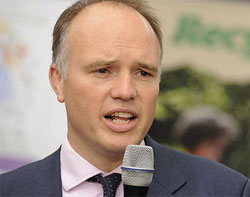Government’s addiction to mega-contracts has been pegged as a key factor in the exclusion of small to medium-sized enterprises (SME) from the public sector IT market.
Deputy government CIO Liam Maxwell (pictured below) and a number of SMEs discussed strategies for breaking the IT oligopoly stranglehold at a recent public sector IT roundtable.

Victor Baldorino, director of networking company Updata, said it had taken his company a long time to make headway into the public sector market, citing large frameworks as key in Updata being excluded from contracts – a factor which is still an issue for the £25m company.
Stephen Allott, SME representative to the Cabinet Office, agreed. “Large contracts in effect eliminate small businesses from the tendering process,” he said at the event organised by Mantis PR.
Breaking the oligopoly
As deputy government CIO and a long-standing campaigner for public sector IT reform, Liam Maxwell is regarded by many as a force for change in Whitehall. For Maxwell, disaggregating large contracts into smaller parts is a crucial first step in broadening the market to SMEs and cutting costs.
“We looked at how much it would save to go from a black box set-up to a disaggregated model. The approximate view is it is certainly north of a 20% saving, just by disaggregating,” said Maxwell.
The next step is to have a much wider range of SMEs engaging with government, with the publication of pipelines a key strategy to get to that point.
“In the IT strategy refresh we will have commitments on pipeline,” said Maxwell.
If SMEs can see pre-tender government requirements, they will be in a better position to build the appropriate skills, he said. “At that point, the SME becomes a credible bidder against a big systems integrator [SI].”
Another weapon in the armoury to break large contracts is the spending controls, which see all contracts above £5m subject to central approval.
Maxwell cited the example of a large department seeking to connect a number of sites across the country for £150m. Following a heated exchange, that figure was reduced to £4m using open source just three months later.
The government's Cloud Store is also yielding significant savings and breaking down contract size, he said. Maxwell cited another example, where an SME was able to offer a like-for-like service for £50,000, compared with an SI which was quoting £4m.
But government still does not know its exact figure for IT spend. Research indicates it could be up to £30bn if the maximum amount on all government lots issued were spent, he said.
“It’s not £26bn across the whole of the public sector, but it's north of £16bn. And it’s still more than 1% of GDP. That’s not running government, but the IT running the government. That is amazing,” he said.
“We have this risk-averse view of procurement, which means we want to bid everything, and we want to put everything on the slate so we can’t be accused of leaving anything out,” he said. Such an approach is putting both government and SMEs at a disadvantage, he said.





